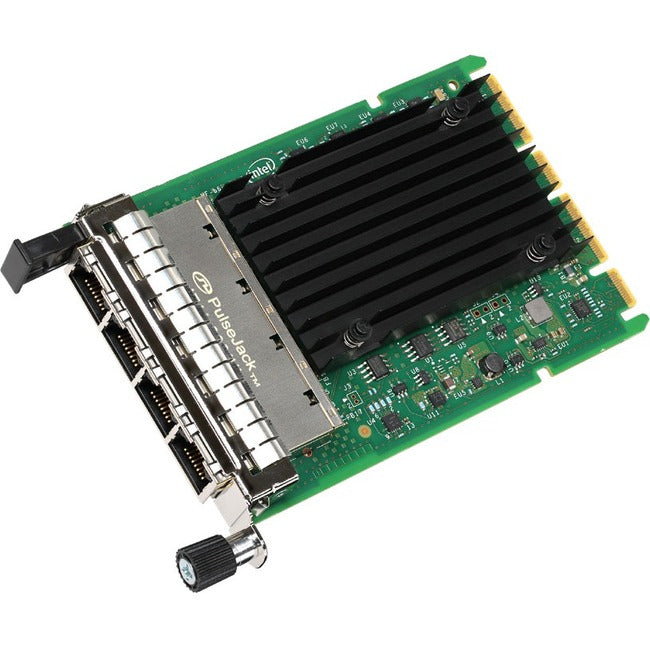Description
The Intel® Ethernet Network Adapter I350-T4 for OCP 3.0 includes enhancements for both virtualized and iSCSI environments. Intel uses a suite of hardware assists that improve overall system performance by lowering the I/O overhead in virtualized environments. iSCSI simplifies SAN connectivity by eliminating the need for SAN-specific adapters or switches.
This adapter also includes power management technologies such as Energy Efficient Ethernet (EEE) and direct memory access (DMA) Coalescing. With Advanced Power Management Technologies, customers can configure power options on the adapter and more effectively manage their power consumption.
The OCP NIC 3.0 specification defines a standardized design for a new generation of network adapters. Simple and straightforward form factors, clear manageability requirements, and improved serviceability help simplify deployment for current and emerging capabilities.
All Intel® Ethernet I350 Series Adapters include these technologies:
Flexible I/O Virtualization
The Intel® Ethernet Network Adapter I350 family includes Intel® Virtualization Technology for connectivity (Intel® VT-c) to deliver I/O virtualization and Quality of Service (QoS) features designed directly into the controller on the adapter. I/O virtualization advances network connectivity models by providing Flexible Port Partitioning (FPP), multiple Rx/Tx queues, and on-controller QoS functionality that can be used in both virtual and non-virtual server deployments.
By taking advantage of the PCI-SIG SR-IOV specification, Intel® Ethernet products enable Flexible Port Partitioning (FPP). With FPP, virtual controllers can be used by the Linux host directly and/or assigned to virtual machines. With this port partitioning, administrators can create up to eight dedicated connections on a single Ethernet port for use in bare-metal and virtualized server deployments.
In a bare-metal Linux server, host processes can be assigned to dedicated network resources to provide traffic isolation and balanced bandwidth allocation.
In a virtualized environment, a VM can be assigned to a virtual controller to reduce the CPU overhead seen when using a software-based network bridge by offloading network traffic management to the controller.
Scalable iSCSI Performance
An Intel Ethernet Network Adapter I350-T4 for OCP 3.0, with native iSCSI initiators for Microsoft Windows, Linux, and VMware ESX platforms, provides a simple, dependable, cost-effective way to connect to iSCSI SANs. These native initiators are broadly tested using multiple generations of operating systems, storage systems, and OS tools to help ensure reliability and ease of use. Standardizing on Intel® Ethernet Adapters enables administrators to use a single initiator, TCP/IP stack, and a common set of management tools and IT policies. In addition, Intel® Ethernet Network Adapters include a number of hardware features designed to accelerate iSCSI traffic and enhance data processing. For example, TCP segmentation offload and checksum offload capabilities help reduce processor usage, increase throughput, and deliver exceptional iSCSI performance. Finally, using native OS initiators, an Intel Ethernet Network Adapter I350-T4 for OCP 3.0 supports the CRC-32 digest instruction set included with Intel® Xeon® processor products, that improves transmission reliability and delivers an enterprise-class iSCSI solution.
- OCP NIC 3.0 adapter
- Innovative power managementfeatures including EnergyEfficient Ethernet (EEE) and DMACoalescing for increasedefficiency and reduced powerconsumption
- Scalable iSCSI performancedelivering cost-effective SANconnectivity
- Reliable and proven GigabitEthernet technology from IntelCorporation
Payment & Security
Vos informations de paiement sont gérées de manière sécurisée. Nous ne stockons ni ne pouvons récupérer votre numéro de carte bancaire.

